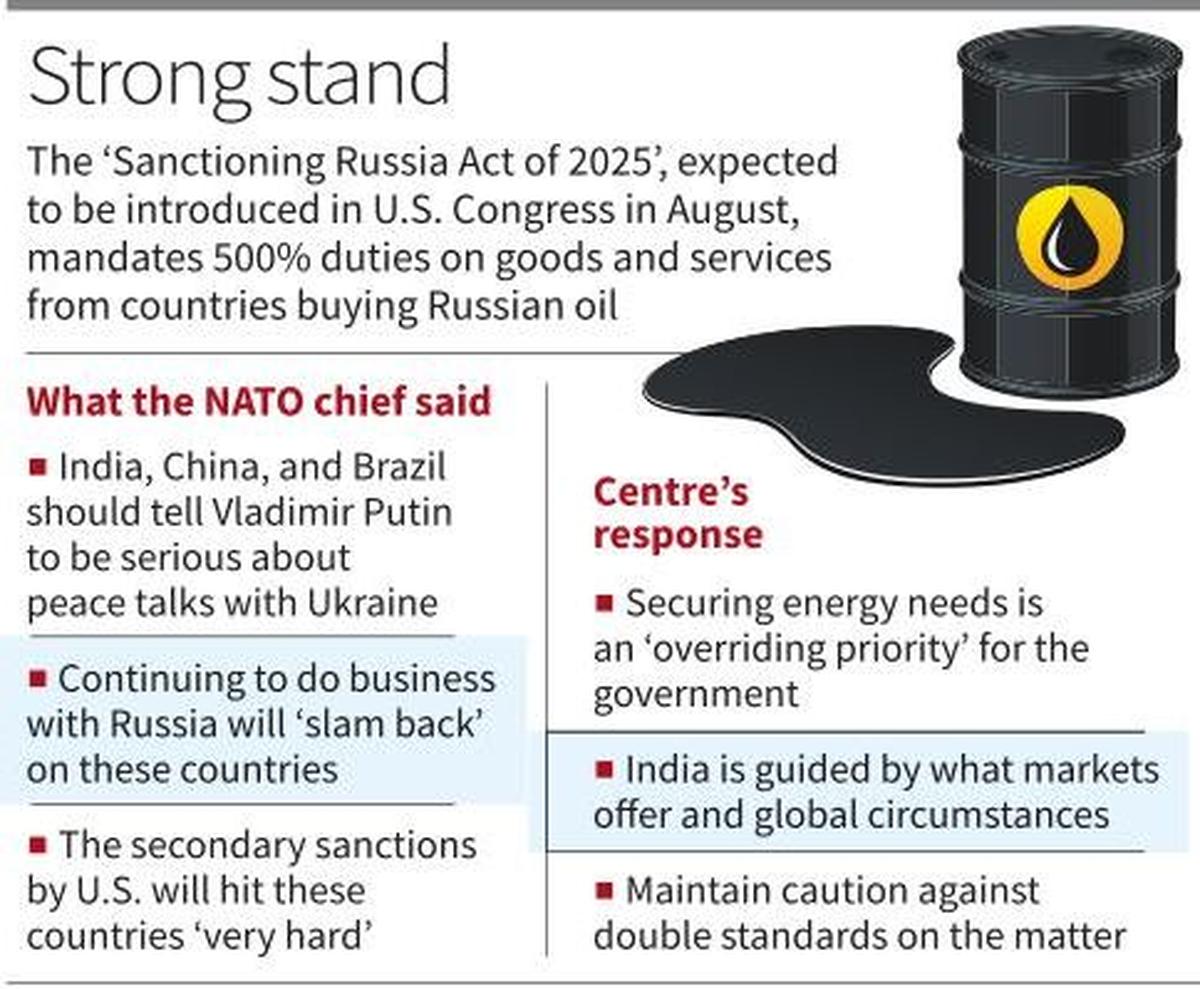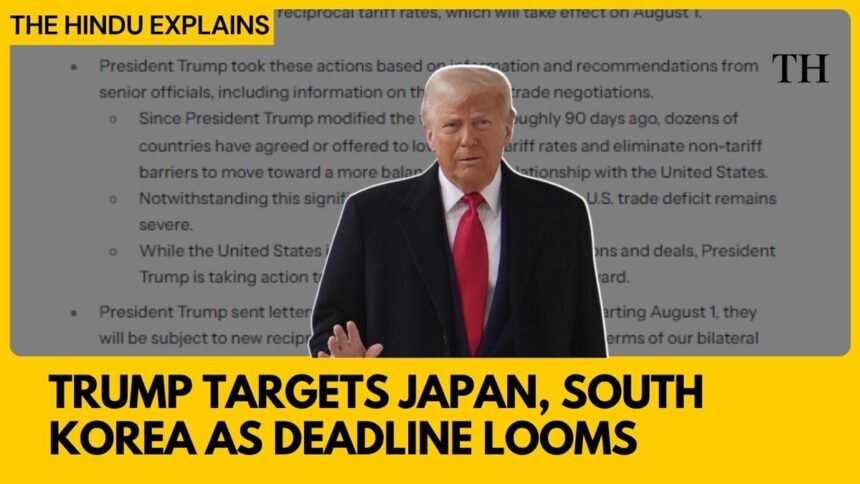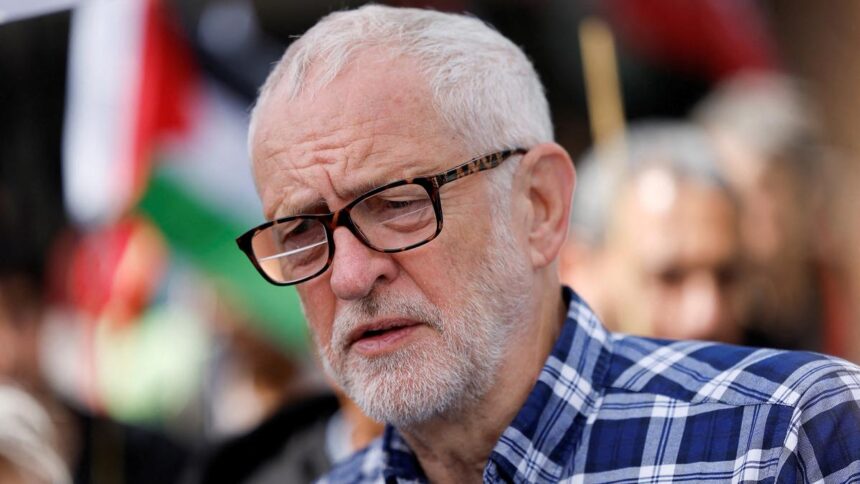
India cautions against double standards amid U.S. consideration of 500% duties on Russian oil buyers.
| Photo Credit: Reuters
India has cautioned against “double standards”, even as U.S. lawmakers consider a Bill that would impose 500% duties on India and other countries buying Russian oil.
The Ministry of External Affairs’ comments comes after indications that U.S. President Donald Trump is backing the Russian Sanctions Act, introduced by a closely-allied Republican Senator Lindsey Graham, and even threatened secondary tariffs of 100% on countries that continue trade on sanctioned Russian products.
On Wednesday, NATO Secretary General Mark Rutte, who met with Mr. Trump and members of the U.S. Congress, also issued a threat, in particular to China, India and Brazil, who are among the top buyers of Russian crude oil, oil products, and coal. Mr. Rutte said “Beijing and Delhi” should push Russian President Vladimir Putin towards ending the war in Ukraine, or face tariffs.

‘Energy needs are top priority’
Responding to questions on the issue on Thursday, the MEA said it was following the developments “closely”. “Securing the energy needs of our people is understandably an overriding priority for us. In this endeavour, we are guided by what is there on offer in the markets, as also by the prevailing global circumstances,” MEA spokesperson Randhir Jaiswal said.
“We would particularly caution against any double standards on the matter,” he added, in a possible reference to the fact that European Union members continue to procure oil, LNG and pipeline gas from Russia despite the sanctions, and are also major buyers of processed products that go through Indian refineries, including Gujarat’s Nayara Energies, which has minority control by Russia’s ROSNEFT. However, while Russia sells about half its oil exports to China, and about 38% to India (as of February 2025), it exports only about 6% to EU countries.
At an industry event in Delhi on Thursday, Union Petroleum Minister Hardeep Puri said that India would “deal” with sanctions when they are passed, pointing out that India has diversified its supply sources, buying oil from about 40 countries now, as opposed to 27 in the past. However, despite requests from Tehran, India has not so far reversed a decision taken under pressure from the first Trump administration in 2017, to stop all oil imports from Iran.

Indian concerns conveyed
The latest comments from the government come as lawmakers in the U.S. prepare to go forward with the Russian Sanctions Act, 2025 that has been introduced in the House and Senate, with 87 and 84 co-sponsors respectively, cutting across party lines. Section 17 of the Act proposes to impose 500% ad valorem duties on countries that buy, sell or transfer “oil, uranium, natural gas, petroleum products, or petrochemical products that originated in the Russian Federation”.
In Washington on July 2, External Affairs Minister S. Jaishankar had confirmed that India’s “concerns” about the Bill and “interests in energy security” had been conveyed to Mr. Graham who, along with Democrat Senator Richard Blumenthal, is sponsoring the Bill. Mr. Graham has said that he believes Mr. Trump supports the law which would give him the power to waive the duties for a period of six months. However, the Republican lawmaker has urged the U.S. President to impose the sanctions earlier than the 50-day deadline proposed at present.
Talks on trade, tariffs, deportees
The proposed sanctions further complicate ties between New Delhi and Washington, who are currently putting the last touches on a ‘mini’ trade deal that officials say will be completed “soon”. Amidst intense negotiations over tariffs, as well as market access to India, particularly in the areas of agriculture, dairy and genetically modified produce, New Delhi has also been coordinating with the U.S. government about the deportation of Indians illegally resident in the U.S.
On Thursday, Mr. Jaiswal said that 1,563 Indian nationals have been deported in the first six months of Mr. Trump’s second tenure, from January 20 to July 15 this year. According to ICE statistics, 1,529 immigration violators were deported in all of 2024, and far less than in the three preceding years. After protests in India over the first few batches of deportees being handcuffed and shackled on board military flights in February this year, the U.S. agreed to send Indians back by commercially chartered flights, including as recently as last week.
Published – July 17, 2025 11:27 pm IST




















